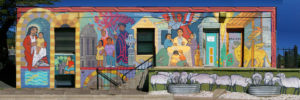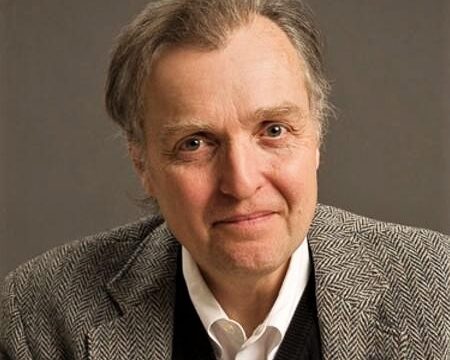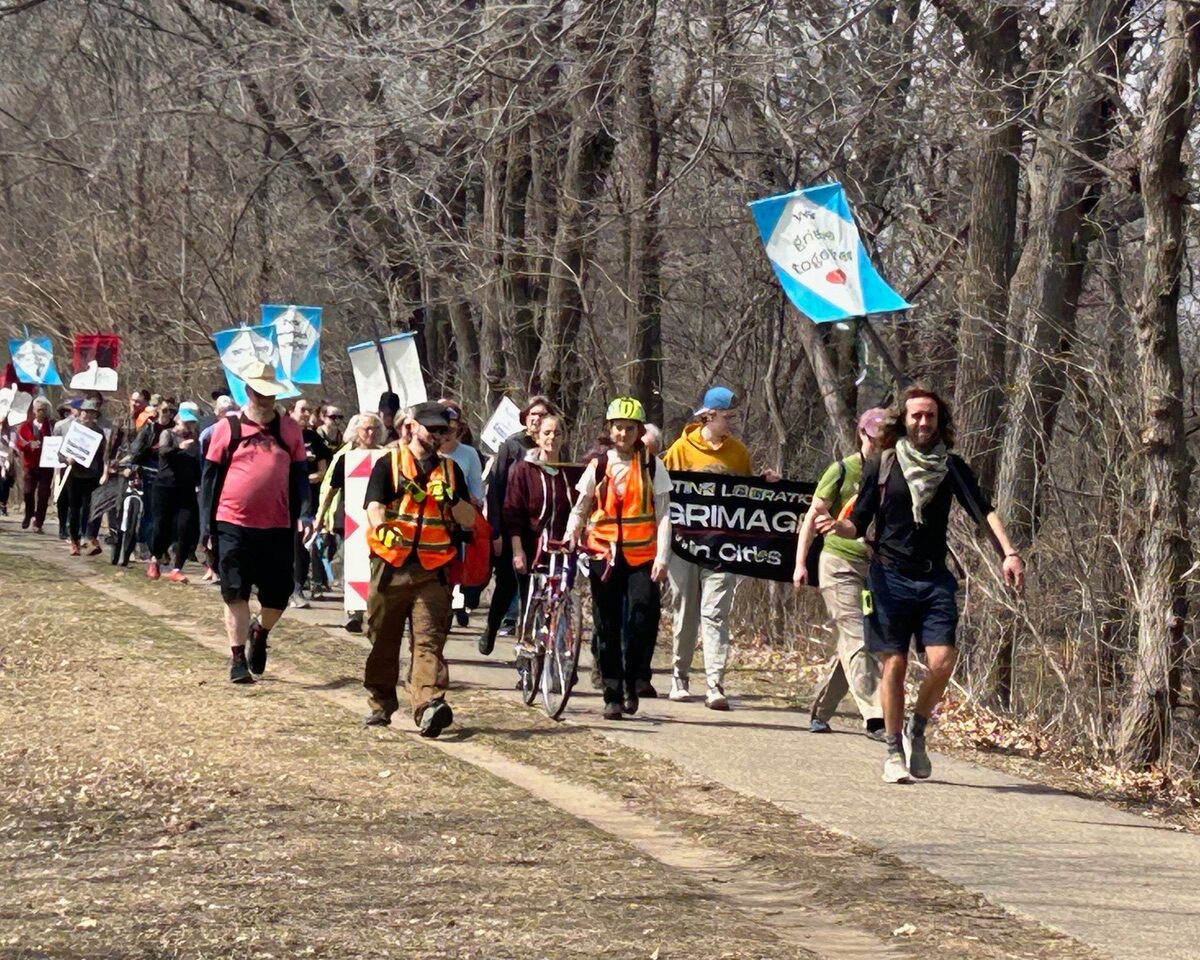Cultural Uniqueness of Trinity Lutheran Congregation
When I talked with Jane Buckley-Farlee, co-pastor of Trinity Lutheran Congregation, we discovered she had been at that church as long as I’ve been at Southside Pride—21 years. I’ve been reporting on religious groups, mostly churches, during all this time; overall, I see them as hidden enclaves doing amazingly positive humanitarian things. In Jane’s 21 years, she has seen a new version of The Church emerge. She has seen it struggling to be what it needs to be.
Trinity Lutheran Congregation, which worships in Augsburg College’s Hoversten Chapel—never having replaced its worship space when its building was displaced by the freeway in the 1960s—is an unusual mingling of cultures. A little over half of the worshippers are Caucasians and the others are Eritreans and Ethiopians, who were Orthodox, Mekane Yesus (Lutheran) or other types of Christians in their countries of origin. It’s notable that Ethiopian and Eritrean Christians worship together since “tension ebbs and flow between Eritrea and Ethiopia in Africa—they’re always on the verge of war,” says Pastor Jane. “Eritreans and Ethiopians want to get along—want a place where they can be together. Trinity is known as a neutral place amongst East Africans in Minneapolis. It’s a gathering place, a meeting ground, specifically for them.”
The main worship services (the 11 a.m. services ) are mostly in English but there are parts in Amharic (for the Ethiopians) and Tigrinya (for the Eritreans). The first time Pastor Jane stood before her congregation saying in Amharic and Tigrinya, “May the grace of our Lord Jesus Christ be with you,” she heard laughter. She found out later she had said, “May the meat of our Lord Jesus Christ be with you.” Now the East Africans know how hard it is for her to hear those sounds and graciously appreciate her continued attempts, she said. Co-pastor Alem Asmelash, who came to the U.S. from Ethiopia by way of Sweden, fares better, she said, since he speaks six languages.
Interfaith Relationships
A fire at the Dar Al-Hijrah Masjid (mosque) on the West Bank, Jan. 1, 2014, presented Trinity Congregation with an opportunity for further multicultural relationships. While the mosque was being repaired, Trinity, together with Augsburg, who rents the lower level of Trinity’s building at 20th and Riverside, invited Dar Al-Hijrah Masjid (and the Islamic Civic Society of America, referred to as ICSA, which was at the same location and organizationally connected to the mosque) to set up their offices in the basement of Trinity’s office building. During the year and a half they were there, mutual trust grew and a deep friendship was formed. During Ramadan, Dar Al-Hijrah invited Trinity to Iftar and it was so successful that everyone was saying, “Let’s not wait until next Ramadan to get together again.”
Over time, Trinity has also developed a relationship with another mosque on the West Bank, Quba Masjid on South 6th Street next to the light rail.
Interfaith Conversations
Out of these connections, interfaith conversations were established, which now meet second and fourth Thursdays from 6:30 to 8:30 p.m. People hear about them by word of mouth. Muslims and Christians attend, of course, but also Jewish people, atheists, humanists, agnostics, Baha’is, “nones” and “dones.” Pastor Jane describes the meetings as follows: “Conversations always include spirituality—a relationship of some sort with a higher power. And, there’s always some form of the question, ‘How does your faith inform your life?’ One time we discussed sacred texts.”
Pastor Jane says, “It’s about relationship building, that’s what changes things, not what you could learn online.” She believes that interfaith conversations are not for the purpose of converting the other. She finds that her own faith is deepened through the experience.
Sadly, other people who identify themselves as Christian or Muslim sometimes give negative response to the interfaith conversations. They send letters or make phone calls or post messages on FB, but thankfully there have been no threats. Mostly they say things like: “You’re not being a good Christian or Muslim by connecting with other faiths.”
Sponsoring a Refugee Family
Based on their continuing friendship, Trinity and DAH ICSA (Dar Al-Hijrah Masjid and the Islamic Civic Society of America), together with Trinity’s mission partners (St. Peder’s Lutheran on 46th Avenue, Nokomis Heights Lutheran ELCA on 10th Avenue at 53rd Street, and Mt. Olivet Lutheran in Plymouth), were able to sponsor a Muslim refugee family (which happened to be Somali as is DAH ICSA) through Lutheran Social Service (LSS). They started the process three years ago, during an earlier travel ban, when states were saying “no more Muslims at this time.” After the two-year vetting process, the family was able to come to Minneapolis. Pastor Jane says, “I don’t know if anyone knows how hard it is for a refugee to get into the U.S.”
Tea and Coffee
In early 2017, one week after the presidential inauguration, when a new Muslim ban was announced, Trinity and Augsburg served tea and coffee outside the Dar Al-Hijrah Masjid as people were leaving on Friday. It was a way of saying “We’re glad you’re here.” The first time, it was really cold, but people showed up to serve because they believed in the importance of it. The tea and coffee welcome has continued since then, on second Fridays, except for summer when people were busy with summer. The plan is to continue, excluding December through February, except in the case of a specific, large anti-Muslim event. Then, no matter what the weather, tea and coffee will be served. It’s a meaningful gesture. Pastor Jane said, “It sounds simple, like it’s nothing—It’s HUGE.”
Future Building
What is the future of Trinity Congregation? Pastor Jane has given a lot of thought to the future of her own congregation as well as The Church as a whole. She knows it can’t stay the same since the terrain has changed. “We are using a map that doesn’t pertain to anything. Young people don’t want meetings, they want social action and justice. They are very spiritual. They don’t care for organized religion; they find it irrelevant.”
Trinity’s hope is to build a center where their worn out office building now stands. Their dream is to replace their two-story, 4,000-square-foot building at Riverside and 20th with a center four stories high and 17,000 square feet.
The new building would have tons of meeting spaces as well as stretching room for programs already in place, such as the Safe Place Homework Help program, which provides homework tutors for both adults and children of any nationality or religion (many of them Somali Muslims), and the free Wednesday night community meals.
The brochure about the proposed building states: “We have an opportunity to collaborate with our partners to provide an oasis of educational enrichment for youth, nourishment for the hungry, respite for the abused, reconciliation for the broken and a safe gathering place for families, friends and neighbors.”
The fact that people of different religions could meet here and work together in respect and love is a major reason for envisioning this as a safe place.
PHOTO CAPTION: The mural on Trinity’s building at 20th and Riverside Is filled with biblical figures. The artist, Larry Rostad, wrote: “We have represented the extended family of faith with paint, in mural form …. Our hope is that Trinity’s mural will contribute to our neighborhood; may visible hand-painted images help reveal the INVISIBLE things of the Spirit.”























